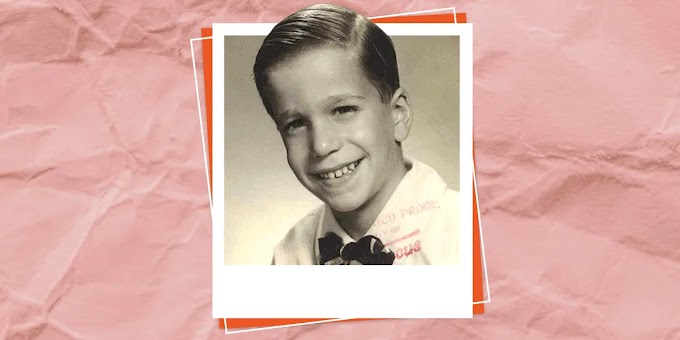With a stellar career spanning decades, this TV icon has charmed audiences worldwide and graced our screens with unforgettable performances.
Yet, beneath the glittering surface of his stardom lies a remarkable tale of triumph over adversity, a journey that began in the most challenging of circumstances.
He was once labeled "dumb" by his parents and struggled with reading until an unexpected revelation at the age of 31 uncovered a hidden disorder that changed the course of his life.
This TV star has graced our screens for years, becoming a beloved figure in the world of entertainment. His charisma and talent have captivated audiences across the globe, making him a household name.
The Journey of a TV Icon
Born into a Manhattan apartment to immigrant parents who had escaped the horrors of Nazi Germany, this TV star's early years were marked by difficulties that could have easily shattered a less determined spirit. The "Happy Days" actor did not have a very happy childhood. In fact, he only ever heard his mother laugh twice. Sharing his experience during childhood, he said:
"When children at school used to say to me, 'My parents and I are going on a trip' or 'We had so much fun together,' I didn't even know how that was possible."
He grappled with a problem that went unnoticed for far too long—a problem that would define his early life and affect his relationship with his parents, his teachers, and even himself. He was surrounded by an atmosphere that was far from nurturing, and his parents' expectations were exceedingly high.
As a child, he had a severe reading disorder, an affliction that set the stage for a tumultuous upbringing. Troubles with reading plagued him from an early age, yet he was met with a lack of understanding and support. Instead of encouragement, his parents misconstrued his genuine struggle as laziness.
Labels and insults became a constant presence in his life, even from those closest to him. His parents gave him a term of endearment that masked the frustration they felt. During an interview, he shared:
"They had an affectionate phrase for me called Dummo Hund. That means dumb dog."
The education system offered no respite, echoing the sentiments of his parents. Teachers, too, believed that this young boy was merely underperforming due to a lack of effort, further exacerbating the internalized sense of inadequacy.
The consequences of these misunderstandings were profound, causing him to spend most of his high school years grounded. His self-image took a severe blow during these formative years as he endured the sting of hurtful labels and the weight of expectations.
The Path to Stardom
Undeterred by his challenging upbringing, the misunderstood Henry Winkler embarked on an ambitious educational journey. He displayed remarkable determination by applying to 28 colleges, demonstrating an unwavering belief in his own potential. He ultimately secured acceptance into two.
But the culmination of his efforts materialized when he received a coveted acceptance letter from the prestigious Yale School of Drama. His audition, an improvised Shakespearean monologue, reflected his innate talent and set the stage for his future success.
Following his time at Yale, he ventured onto the stage and dabbled in commercials, slowly but steadily building a foundation for his acting career. By the age of 27, he had risen to become one of television's brightest stars, even though his dyslexia remained a formidable adversary.
It wasn't only his reading that was affected but also his physical coordination, with simple tasks like riding a motorcycle proving challenging. Nevertheless, his acting prowess continued to shine, and his confidence on screen continued to grow.
The outside world saw a confident, smooth, and charismatic actor, but behind the scenes, he battled the invisible barriers his condition imposed. At one point in his career, he even refused the leading role in "Grease." When an interviewer asked him why, he commented with humor, "Because I'm an idiot." In reality, he was worried about being typecast.
The Life-Changing Revelation and Beyond
The turning point in his life came later than one might expect. It was at the age of 31, during his stepson's routine check-up, that the pieces of the puzzle fell into place. As they were having his stepson, Jed, tested for dyslexia, a realization dawned on him. The characteristics described by the experts matched his own struggles.
The burden of dyslexia, a condition that had hindered his personal and professional life for so long, now had a name. Winkler's career journey was marked by improvisation and memorization, skills he honed to appear as if he were effortlessly keeping up. His reading disorder caused him a lot of pressure during auditions.
Memorizing scripts quickly became his strategy, as he found it challenging to read and act simultaneously. He even learned how to mask his perceived inadequacies with humor, and it worked. If the casting director or producers noted discrepancies between his performance and the script, he offered a simple explanation:
"I'm giving you the essence of the character."
Life Beyond "Happy Days"
After the end of "Happy Days," the toughest chapter in Winkler's career began. Between 1983 and 1991, he faced a period of uncertainty, unable to secure acting roles. To fill the void, he ventured into producing and played a crucial role in creating the original "MacGyver" TV series.
This transitional phase in his career showcased his versatility and adaptability, solidifying his position in the entertainment industry. Post-"MacGyver," Winkler's career expanded in diverse directions. His talents extended beyond acting to include directing and producing, and his presence became a constant in the entertainment field.
Weitzman's unwavering support and belief in Winkler played a pivotal role in his journey. She provided the necessary foundation that allowed him to pursue his dreams and continue his remarkable career. Weitzman was not only his partner in life but also the backbone of their family, enabling him to believe in himself and overcome the challenges he faced.
As he continues to inspire, Winkler's journey is a story that transcends entertainment; it is a story of the human spirit's capacity to overcome adversity. His strength and determination leave an indelible mark on the hearts of those who have been touched by his work and his enduring legacy.






















